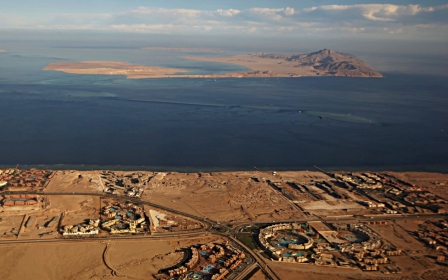Legal confusion in Egypt as court backs Red Sea islands transfer to Saudi

An Egyptian court on Sunday reversed a previous judicial decision to block the transfer of two Red Sea Islands to Saudi Arabia, but lawyers in the case immediately questioned whether it had the authority to do so.
The 's Court of Urgent Matters overturned a judgement by the High Administrative Court in January to reject a government plan to transfer the uninhabited islands of Tiran and Sanafir to Saudi Arabia after a maritime demarcation accord was announced in April, triggering protests by the Egyptian public, who believe the islands are Egyptian.
However, the Court of Urgent Matters ruled on Sunday that the High Administrative Court did not have jurisdiction over the matter.
The two courts have been ruling against each other's decisions for the past year, raising questions of legitimacy and constitutional procedure.
Malek Adly, one of the lawyers who challenged the Egypt-Saudi agreement in front of the High Administrative Court, told the Egyptian newspaper al-Ahram that the Court for Urgent Matters, as a lower court, did not have jurisdiction to issue verdicts in the matter and could not challenge verdicts made by the High Administrative Court, as the latter had a higher judicial authority.
The Court of Urgent Matters has often been used by the government to pass quick resolutions that favoured the Egyptian cabinet or to stifle political dissent.
Tarek Elawady, another lawyer in the case, similarly wrote on Facebook that today's decision was irrelevant. The Court of Urgent Matters had already tried to reverse the administrative court's ruling in September.
Ownership of Tiran and Sanafir, the uninhabited islands at the entrance to the Gulf of Aqaba, has long been disputed, with Cairo and Riyadh both claiming them, although they have been under Egyptian control for more than 30 years.
They are considered strategically important because they lie on the key sea route to the Jordanian port of Aqaba and the Israeli port of Eilat.
The islands were occupied by Israel in 1967 during the Six Day War, before being handed back to Egypt in 1982 when the two sides signed the Camp David peace accords.
A deal to hand over the islands was signed during a visit to Cairo last year by Saudi King Salman, when Riyadh showered Egypt with aid, prompting accusations that the government had "sold" the strategic islands.
Khaled Ali, a lawyer who argued in the administrative court that the islands belonged to Egypt, said Sunday's verdict aimed to give the government "judicial cover" as it pushes to hand over the territory.
"They are trying to forge false legitimacy through a court lacking competence to justify presenting the agreement to parliament," Ali told AFP.
Tarek el-Khouli, secretary of parliament's foreign relations committee, said the government has submitted the case to the house but debates have yet to start.
"There are extreme contradictions over the matter of competence. Some describe the issue as a matter of sovereignty and therefore should not be under the judiciary's competence," while others say the opposite, said Khouli.
Stay informed with MEE's newsletters
Sign up to get the latest alerts, insights and analysis, starting with Turkey Unpacked
Middle East Eye delivers independent and unrivalled coverage and analysis of the Middle East, North Africa and beyond. To learn more about republishing this content and the associated fees, please fill out this form. More about MEE can be found here.





